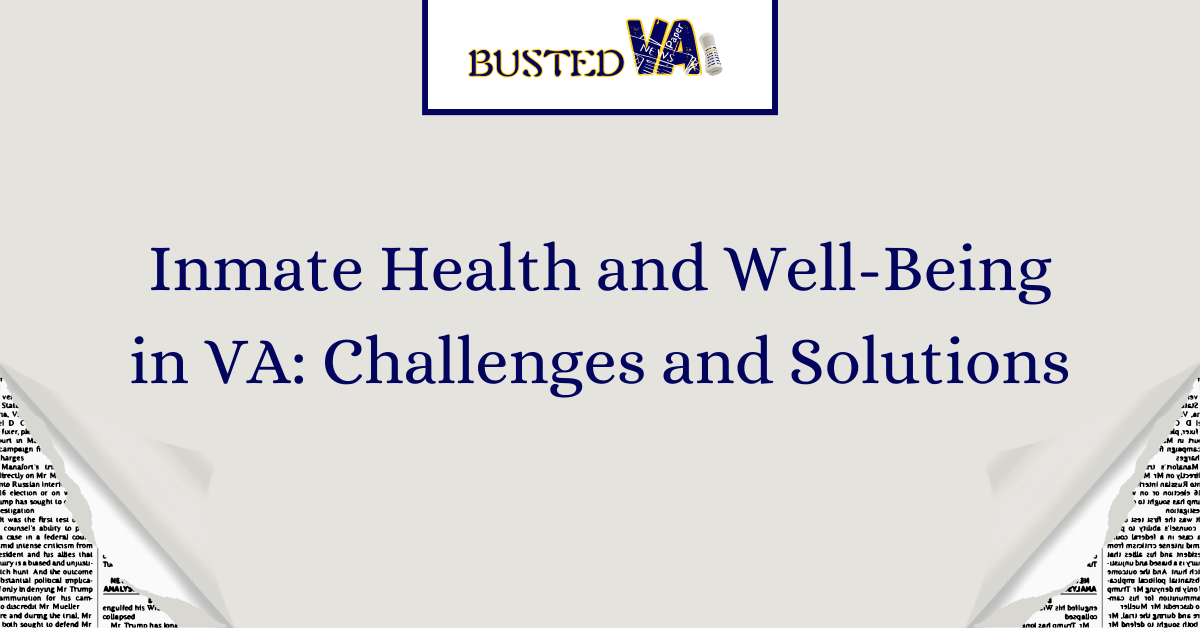Inmate Health and Well-Being in VA: Challenges and Solutions
Ensuring the health and well-being of inmates is a crucial aspect of any correctional system. In Virginia, this responsibility is taken seriously, with a focus on addressing the unique challenges faced by incarcerated individuals. From physical and mental health to access to quality healthcare, the Virginia Department of Corrections is committed to finding effective solutions that promote the overall well-being of its inmate population.
One of the primary challenges in maintaining inmate health in VA is the prevalence of chronic conditions among this population. Issues such as substance abuse, mental illness, and infectious diseases require specialized care and treatment. Recognizing this, the Department of Corrections has implemented comprehensive programs that provide inmates with the necessary medical attention and support. Through collaboration with healthcare professionals and community organizations, these initiatives aim to address the underlying causes of these conditions and facilitate successful rehabilitation.
Addressing Substance Abuse
One of the most significant challenges faced by the Virginia Department of Corrections is addressing substance abuse among the inmate population. Recognizing the detrimental effects of addiction, the department has developed comprehensive programs aimed at supporting inmates on their path to recovery.
Through partnerships with addiction treatment specialists, inmates have access to counseling, therapy, and evidence-based interventions. These programs aim to address the underlying causes of substance abuse and provide inmates with the necessary tools and support to overcome addiction.
Mental Health Support
Another crucial aspect of inmate health in Virginia is addressing mental health issues. Many incarcerated individuals face conditions such as depression, anxiety, and post-traumatic stress disorder. To ensure the well-being of these individuals, the Department of Corrections has implemented specialized mental health programs.
Qualified mental health professionals provide counseling and therapy to inmates, helping them cope with their conditions and develop healthy coping mechanisms. The department also focuses on raising awareness about mental health and reducing the stigma associated with seeking help.
Preventing Infectious Diseases
The Virginia Department of Corrections takes proactive measures to prevent the spread of infectious diseases within correctional facilities. Recognizing the heightened risk of transmission in these environments, the department implements robust infection control protocols.
Inmates receive regular health screenings, including tests for common infectious diseases. Those diagnosed with infectious conditions are provided with appropriate medical treatment and isolated to prevent further spread. Additionally, the department educates inmates about hygiene practices and offers vaccination programs to minimize the risk of outbreaks.
Improving Access to Quality Healthcare
Ensuring access to quality healthcare is a top priority for the Virginia Department of Corrections. In collaboration with healthcare professionals, the department works to provide comprehensive medical services to inmates.
Primary care services, including routine check-ups and preventive screenings, are readily available to all inmates. Additionally, the department collaborates with specialists to address complex medical conditions and provides necessary treatments, such as medication management and surgical interventions.
Promoting Successful Rehabilitation
Ultimately, the goal of the Virginia Department of Corrections is to facilitate successful rehabilitation for inmates. Through comprehensive healthcare programs and support services, the department aims to address the unique challenges faced by incarcerated individuals and promote their overall well-being.
By addressing substance abuse, mental health, infectious diseases, and improving access to quality healthcare, the department creates an environment conducive to successful rehabilitation. Inmates have the opportunity to address their underlying health issues, develop necessary life skills, and prepare for a successful reintegration into society.
FAQs
What challenges do inmates face in terms of health and well-being in VA?
Inmates in Virginia, like those in many other states, face various challenges related to health and well-being during their incarceration. Some common challenges include
How is the healthcare system for inmates in VA structured?
The healthcare system for inmates in Virginia is typically structured to address the unique healthcare needs of incarcerated individuals. Key features include
Department of Corrections Healthcare Services: The Virginia Department of Corrections (VADOC) is responsible for providing healthcare services to inmates within state correctional facilities. The VADOC works to ensure that inmates receive necessary medical care and treatment during their incarceration.
How are mental health issues tackled in VA inmates?
In VA, efforts are made to address mental health issues among inmates through counseling services, therapy sessions, and psychiatric evaluations. Additionally, programs are implemented to help inmates develop coping mechanisms and provide support for their mental well-being.
Managing infectious diseases in VA jails?
To control the spread of infectious diseases, correctional facilities in VA follow strict protocols. These include regular testing, isolation of infected individuals, and providing necessary treatment. Inmates are also educated about preventive measures such as proper hygiene and safe practices.
How’s VA improving inmate health?
Efforts are being made to improve inmate health and well-being in VA through various initiatives. These include increasing access to healthcare services, implementing mental health programs, providing education on healthy lifestyle choices, and promoting rehabilitation and reintegration into society.







